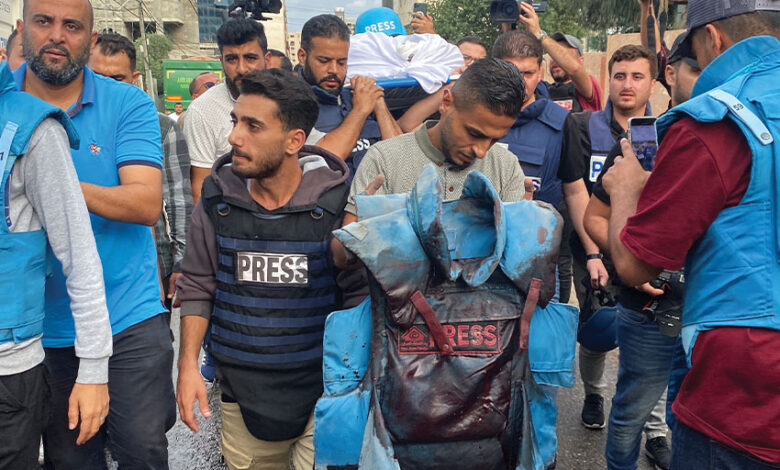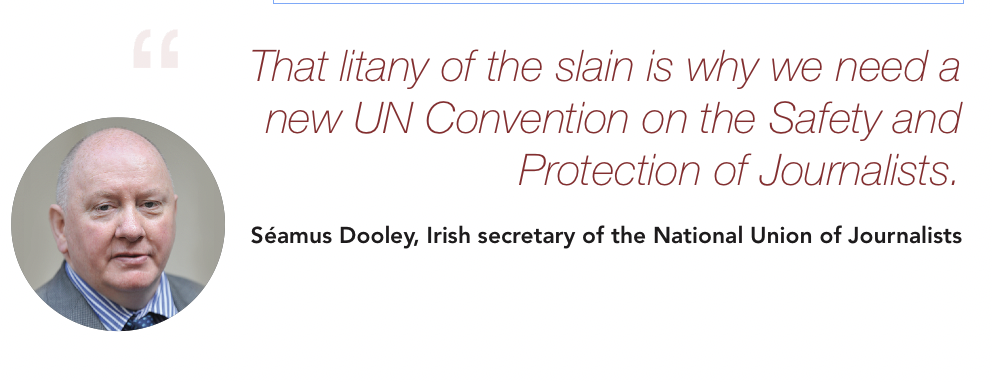TRADE UNION DESK Truth is the first casualty of war

The truism that truth is the first casualty of war was never more apposite than in the context of the current bloody conflict between Israel and Palestine. Séamus Dooley, Irish secretary of the National Union of Journalists (NUJ), writes.
In an era of disinformation, distilling facts from propaganda is a herculean task fraught with difficulties and increasing dangers.
On 13 December 2023, the Committee for the Protection of Journalists published a preliminary investigation showing that at least 63 journalists had been killed since the Hamas attack on Israel on 7 October.
The horrendous attack launched by Hamas – and its allies – targeted civilians and, in some cases, subjected them to acts of grotesque violence. In condemning the actions of Hamas, the NUJ has condemned the actions of Israel in targeting a densely populated area, the destruction of residential buildings, the killing of civilians and the displacement of thousands of families.
In highlighting the need to protect journalists I am in no way minimising the suffering of those trapped in Gaza or those who suffered at the hands of Hamas: all human beings share the same colour of blood regardless of race, religion, ethnic origin, or profession.
For many years we have spoken out against Israeli forces bombing media offices, the arrest and the abuse and violence against Palestinian and international journalists amid escalating violence in Gaza.
With the International Union of Journalists, the NUJ has taken a complaint to the International Criminal Court over the murder of Shireen Abu Akleh and injured journalist Ali Samoudi and called many times on the UN Security Council, to take urgent action to stop the deliberate and systematic targeting of journalists in Gaza.
Those calls have gone unheeded and recent developments are part of a consistent pattern.
Article 79 of the Geneva Convention states: “Journalists in war zones must be treated as civilians and protected as such, provided they play no part in the hostilities.”

Under international law, media facilities are civilian objects and as such enjoy general protection. The prohibition on attacking civilian objects has been firmly established in international humanitarian law since the beginning of the 20th century and was reaffirmed following establishment of the International Criminal Court.
It was deeply disturbing to read Israel’s announcement on 27 October 2023 that it could not guarantee the safety of journalists in the Gaza Strip.
It is vital that independent journalists are facilitated in covering the war and that the UN seeks to enforce that right. The targeting of journalists or media facilities is a war crime and should be treated as such.
Journalists are targeted because it is easier to break international laws away from the cameras and the prying eyes of journalists. Attempts to censor or silence journalists are also contrary to Article 19 of the Universal Declaration of Human Rights.
Across the globe, journalism has become a dangerous profession: 86 journalists were killed in 2022, amounting to one every four days, up from 55 killings in 2021.
At the close of the recent biennial delegate conference of the NUJ’s Irish members, delegates gathered at the Garden of Remembrance in Dublin to mourn not just the journalists killed in Israel and the Occupied Palestinian Territory, but also those killed over two years in Haiti, Kazakhstan, Myanmar, Mexico, Brazil, Chad, Turkey, Central African Republic, Guatemala, Philippines, Bangladesh, Chile, Honduras, Yemen, Ecuador, USA, Paraguay, Somalian, Columbia, Keyna, Syria, Cameroon, Rwanda, Afghanistan, Albania, Lesotho, Lebanon, and Ukraine.
That litany of the slain is why we need a new UN Convention on the Safety and Protection of Journalists. The UN must ensure that those who seek to speak truth to power do not pay with their lives.





